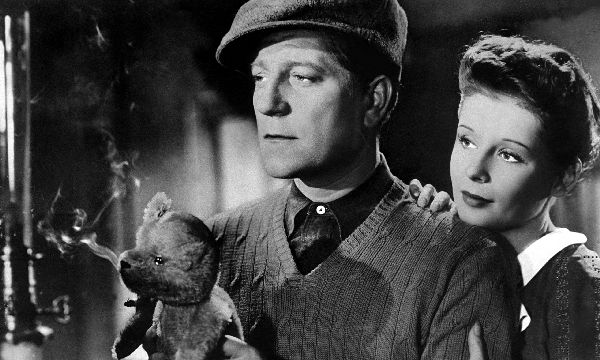Le jour se lève (1939) 

Le jour se lève (1939)
Director: Marcel Carné
Cast: Jean Gabin, Jacqueline Laurent, Arletty
Synopsis: After committing a murder, a man locks himself in his apartment and reflects upon the events that led to the killing.
There’s a theory that Marcel Carne’s Le jour se leve embodies the collective French state of mind as the clouds of war gathered over Europe. It was released in July 1939, just two months before war was declared, and less than a year before the Nazis invaded France. Whether this was a comment on the National psyche on the eve of war is debatable, but there’s no denying that the sense of impending doom is palpable.
Jean Gabin (Quai des brumes) plays the film’s anti-hero, Francois, a working man holed up in a seedy room waiting for the police to gun him down for the murder of a man. There’s no doubt that Francois is a killer – in the film’s opening scene we see him follow his fatally wounded victim from the room. The victim was Valentin (Jules Berry), and the motive – as it so often is – was the love of a woman. We gain a keen sense of Francois’s love for fellow-orphan and flower-seller, Francoise (Jacqueline Laurent) in an earlier scene in which he unsuccessfully attempts to coax an invitation to spend the night from her (as this is a French movie, told in only the way the French can, it exercises a much more explicit approach to sex – and even includes a scene in which the actress Arletty appears nude). We also see his darker side as he secretly follows her to determine the reason for her refusal to let him stay.
There’s a lot of talk about freedom and liberty in Le jour se leve, but none of its characters are truly free; they’re all trapped, and only death brings them freedom. Gabin chain smokes in his narrow room, brooding over the past in a sequence of flashbacks that seem commonplace today but which were ground-breaking at the time. The trouble is the film’s a little too broody, the sense of foreboding a touch too oppressive. The beauty of the film is to be found in the way Carne succeeds in getting across the enduring, desperate intensity of Francois’s love for Francoise, and the way in which the bad luck which he believes has always dogged him proves to be as much the product of his own personality as external forces.
(Reviewed 4th April 2015)
httpv://www.youtube.com/watch?v=TlLqSYt3EdM

